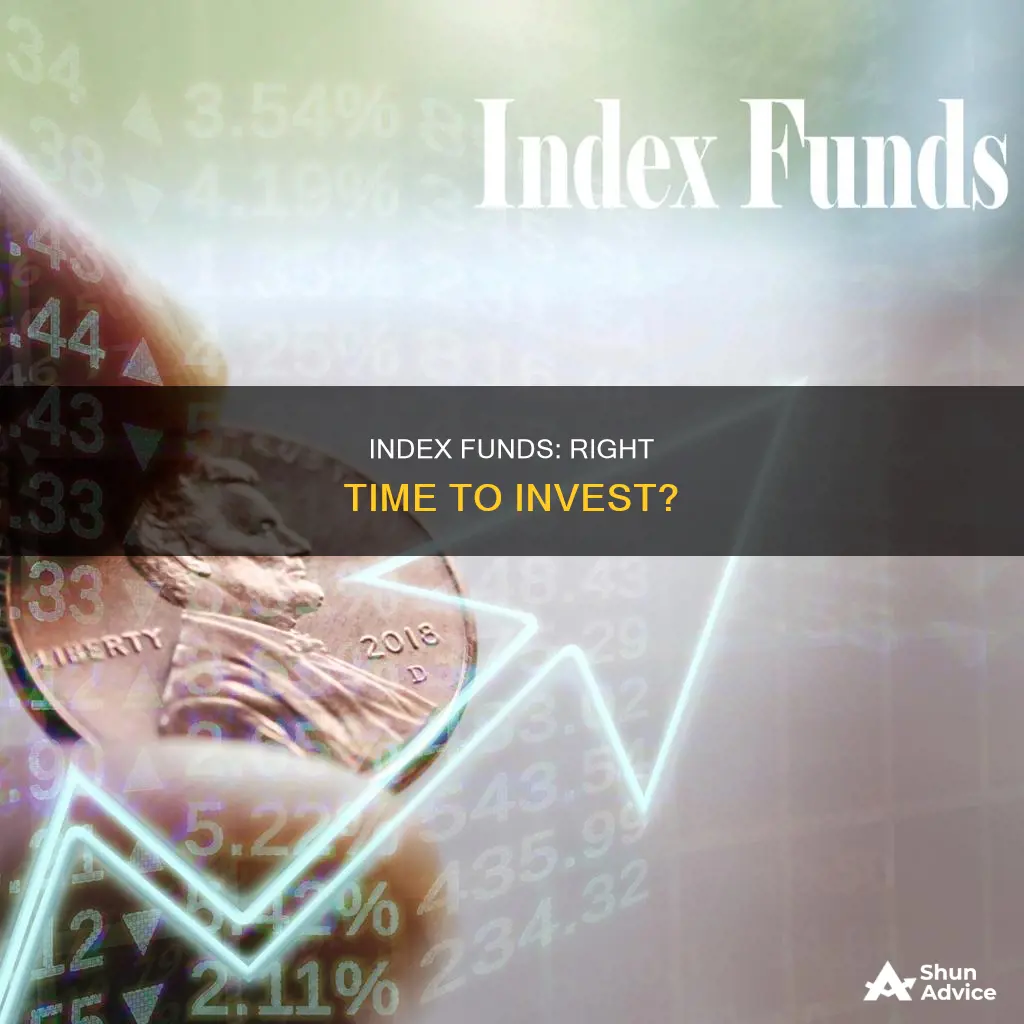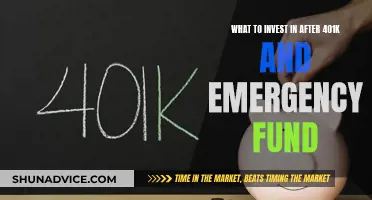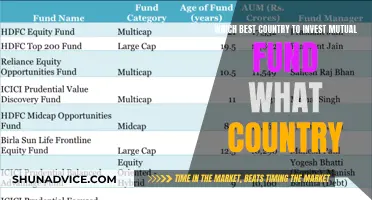
Index funds are a popular investment choice due to their low costs, diversification, and attractive returns. They are a type of investment fund that bundles individual securities, such as stocks or bonds, into a single investment portfolio designed to track the performance of a specific market index. The best time to invest in index funds depends on various factors, including your investment goals, market conditions, and your risk tolerance.
Index funds are suitable for long-term investors as they offer slow but steady growth over time. The market tends to rise in the long run, making index funds a good choice for those seeking a set it and forget it investment strategy. However, it's important to remember that there is no foolproof method for predicting the performance of different types of mutual funds, especially in the short term.
When deciding whether to invest in index funds, consider the advantages they offer, such as low costs, diversification, tax efficiency, and minimal investment research. Additionally, evaluate the fees associated with index funds, including investment minimums, expense ratios, and trading costs.
Ultimately, the decision to invest in index funds depends on your financial goals, risk tolerance, and investment horizon. If you are comfortable with the potential risks and have a long-term investment horizon, index funds can be a good option to consider for building wealth over time.
| Characteristics | Values |
|---|---|
| Best time to invest | Any time can be a good time to invest in index funds, especially if you're investing for the long term. |
| Best type of fund | This depends on market conditions. During a strong bull market, active funds may lose their advantage, whereas during volatile markets, active funds can sometimes outperform index funds. |
| Advantages | Low cost, broad diversification, attractive returns, simple, low-risk. |
| Disadvantages | Can underperform and lose money for years, no chance of beating the benchmark, short-term downside risk, exposure to undesirable stocks. |
What You'll Learn

Index funds vs. individual stocks
Index funds are a type of investment fund that bundles together individual securities, such as stocks and bonds, into a single investment vehicle that tracks the performance of a specific market index, like the S&P 500. They are designed to be well-diversified, low-cost, and low-risk investment options. By investing in an index fund, individuals gain exposure to a wide range of securities, reducing the risk associated with investing in individual stocks.
When comparing index funds to individual stocks, there are several key considerations:
Diversification
Index funds offer built-in diversification by providing exposure to a broad range of securities within a single investment. This diversification helps to reduce risk, as the performance of the fund is not dependent on the success of a single company. In contrast, investing in individual stocks requires careful selection and diversification across different companies and industries to mitigate risk.
Risk
Index funds are generally considered lower-risk investments compared to individual stocks. The diversification inherent in index funds means that the impact of any single security on the overall performance of the fund is limited. On the other hand, investing in individual stocks carries a higher risk, as the performance of a single stock can be influenced by various factors specific to the company, such as management decisions, industry trends, and market sentiment.
Returns
While index funds offer diversification and lower risk, the potential returns may be more modest compared to individual stocks. Investing in individual stocks can lead to higher returns, especially if the selected companies perform well and experience significant growth. However, it is important to note that picking winning stocks requires extensive research and a deep understanding of the market and individual companies.
Effort and Control
Investing in index funds requires less effort and time compared to selecting individual stocks. Index funds are passively managed, meaning the fund managers aim to replicate the performance of the underlying index without actively selecting securities. In contrast, investing in individual stocks requires active management, where investors need to continuously research and monitor the performance of the companies they invest in. Additionally, with index funds, investors have less control over the specific securities they invest in, as the fund composition is predetermined.
Fees
Index funds typically have lower fees compared to actively managed funds, including those investing in individual stocks. The management expense ratio (MER) of index funds tends to be lower, and some even charge zero fees. In contrast, investing in individual stocks may incur higher transaction costs and brokerage fees, depending on the platform used for trading.
In summary, index funds offer a convenient, well-diversified, and lower-risk investment option, making them suitable for investors seeking a long-term, "set it and forget it" investment strategy. On the other hand, investing in individual stocks can be more time-consuming and risky but may offer the potential for higher returns.
Invest in Suntrust Mutual Fund: Secure Your Future
You may want to see also

The pros and cons of index funds
Index funds are a popular investment choice as they offer the potential for more stable returns over time, a diversified portfolio of holdings, and low fees. However, they also have their downsides. Here are the pros and cons of investing in index funds:
Pros
- Low fees: Index funds are passively managed, meaning fund managers take a hands-off approach and invest in companies in the market index it follows. As a result, they trade holdings less often than actively managed funds, leading to lower management fees.
- Diversification: Index funds invest in numerous stocks, reducing the risk of your portfolio being significantly impacted by the poor performance of a single stock.
- Long-term performance: Index funds tend to provide more stable and predictable returns over the long term.
- Simplicity: Index funds are good for beginners as they don't require knowledge of investing or financial markets.
Cons
- Lack of downside protection: Index funds leave investors vulnerable to market downturns.
- Lack of reactive ability: Index funds do not allow investors to act on knowledge of overvalued or undervalued stocks.
- No control over holdings: Investors have no control over the individual holdings in an index fund portfolio.
- Limited exposure to different strategies: Index funds may not provide access to successful investing strategies.
- Dampened personal satisfaction: Investing in index funds can be less satisfying than investing in individual stocks and may still cause worry during market turmoil.
Super Funds: Where Your Money is Invested
You may want to see also

How to choose an index fund
Index funds are a great investment for building wealth over the long term. They are a group of stocks that aim to mirror the performance of an existing stock market index, such as the Standard & Poor’s 500 index.
- Have a goal for your index funds: Before you start investing in index funds, it's important to know what you want your money to do for you. If you're looking for a short-term place to park your money and earn a bit of interest, you may be more interested in certificates of deposit, savings accounts or money market funds. But if you're looking to let your money grow slowly over time, particularly if you're saving for retirement, index funds may be a great investment for your portfolio.
- Research index funds: Once you know what index you want to track, it's time to look at the actual index funds you'll be investing in. When you're investigating an index fund, it's important to consider several factors, such as company size and capitalization, geography, business sector or industry, asset type, and market opportunities.
- Pick your index funds: When choosing an index fund, cost is an important factor. Low costs are one of the biggest selling points of index funds. They are cheap to run because they are automated to follow the shifts in value in an index. However, don't assume that all index mutual funds are cheap. They still carry administrative costs, which are subtracted from each fund shareholder's returns as a percentage of their overall investment.
- Decide where to buy your index funds: You can purchase an index fund directly from a mutual fund company or a brokerage. The same goes for exchange-traded funds (ETFs). When you're choosing where to buy an index fund, consider fund selection, convenience, trading costs, impact investing, and commission-free options.
- Keep an eye on your index funds: Index funds are passive management strategies, so you don't need to actively monitor them. However, it's important to ensure that your index fund is doing its job by mirroring the performance of the underlying index. Also, keep an eye on the fees, and reevaluate your index fund if the fees start stacking up over time.
Vanguard Index Fund: When to Invest for Maximum Returns
You may want to see also

How to buy an index fund
Investing in an index fund is a great way to build wealth over time, especially for beginners. Index funds are a group of stocks that mirror the performance of an existing stock market index, such as the S&P 500.
- Set a goal: Before investing, determine your financial goals and risk appetite. Ask yourself if you are looking for short-term gains or long-term wealth accumulation. Index funds are generally suitable for long-term investment horizons.
- Research index funds: Familiarize yourself with the different types of index funds available. They can vary based on company size and capitalization (small, medium, or large companies), geography (domestic or international), business sector or industry, asset type (bonds, commodities, cash), and market opportunities (emerging markets).
- Choose an index fund: Select an index fund that aligns with your investment objectives and risk tolerance. Consider factors such as the fund's track record, costs, and investment minimums. Compare the fees and investment requirements of different funds that track the same index.
- Decide on a brokerage or fund provider: You can purchase index funds directly from a mutual fund company or through a brokerage. Compare the fund selection, convenience, trading costs, and impact investing options offered by different providers. Some brokerages may offer commission-free options or waive certain fees.
- Open an investment account: To purchase shares of an index fund, you will need an investment account. You can use a brokerage account, an individual retirement account (IRA), or a Roth IRA.
- Buy the index fund: Decide on the amount you want to invest, considering the share price of the index fund and your budget. You may be able to select a fixed dollar amount or choose a specific number of shares to purchase.
- Monitor your investment: Periodically review the performance of your index fund. Ensure that it is mirroring the underlying index it tracks. Also, keep an eye on fees and expenses to ensure they don't outweigh the potential returns.
Remember, investing in index funds, like any other investment, carries risks. It's important to do your own research and consult with a financial advisor before making any investment decisions.
Mutual Fund Investment: Choosing the Right Funds for You
You may want to see also

The best index funds to invest in
Index funds are a great investment for building wealth over the long term. They are a group of stocks that mirror the performance of an existing stock market index, such as the S&P 500.
- Fidelity ZERO Large Cap Index (FNILX): This fund has no expense ratio and tracks the Fidelity U.S. Large Cap Index. It has a 5-year annualized return of 16%.
- Vanguard S&P 500 ETF (VOO): This fund tracks the S&P 500 index and is backed by Vanguard. It has an expense ratio of 0.03% and a 5-year annualized return of 16%.
- SPDR S&P 500 ETF Trust (SPY): The granddaddy of ETFs, this fund was founded in 1993 and is sponsored by State Street Global Advisors. It has an expense ratio of 0.095% and a 5-year annualized return of 15.9%.
- IShares Core S&P 500 ETF (IVV): This fund is sponsored by BlackRock and has an inception date of 2000. It has an expense ratio of 0.03% and a 5-year annualized return of 16%.
- Schwab S&P 500 Index Fund (SWPPX): This fund is sponsored by Charles Schwab and has an expense ratio of 0.02% and a 5-year annualized return of 16%.
- Shelton NASDAQ-100 Index Direct (NASDX): This fund tracks the performance of the largest non-financial companies in the Nasdaq-100 Index. It has an expense ratio of 0.52% and a 5-year annualized return of 21.8%.
- Invesco QQQ Trust ETF (QQQ): This fund tracks the performance of the largest non-financial companies in the Nasdaq-100 Index and is managed by Invesco. It has an expense ratio of 0.20% and a 5-year annualized return of 21.9%.
- Vanguard Russell 2000 ETF (VTWO): This fund tracks the Russell 2000 Index and is sponsored by Vanguard. It has an expense ratio of 0.10% and a 5-year annualized return of 9.4%.
- Vanguard Total Stock Market ETF (VTI): This fund covers the entire universe of publicly traded stocks in the U.S. and is sponsored by Vanguard. It has an expense ratio of 0.03% and a 5-year annualized return of 15.2%.
- Fidelity 500 Index Fund (FXAIX): This fund seeks to closely track the returns and characteristics of the S&P 500 Index. It has a 5-year total return of 14.93%.
- Schwab U.S. Large-Cap Growth Index Fund (SWLGX): This fund invests at least 90% of its net assets in securities included in the Russell 1000 Growth Index. It has a 5-year total return of 18.7%.
- Fidelity U.S. Sustainability Index Fund (FITLX): This fund is the only fund on the list that tracks the MSCI USA ESG Index, which represents the performance of stocks of large- to mid-cap U.S. companies with high environmental, social, and governance (ESG) performance. It has a 5-year total return of 15.45%.
Vanguard Index Fund: Minimum Investment Requirements and Opportunities
You may want to see also
Frequently asked questions
Index funds are a great way to diversify your investment portfolio while minimising fees and risk. They are also popular with investors because they promise ownership of a wide variety of stocks, greater diversification, lower risk and attractive returns, all at a low cost.
Index funds are designed to match the performance of the market or a specific benchmark index, so there is no chance of beating the market. They can also be volatile places to put your money, especially when the economy or stock market is performing poorly. Depending on the index you choose, you could end up owning some stocks you'd rather not own while missing out on others you'd prefer.
Firstly, you should consider your investment goals and risk tolerance. Then, you should research different index funds and decide which index or indexes you want to track. Finally, you should consider factors such as costs, taxes, investment minimums and trading costs when deciding which fund to invest in and where to buy it.







